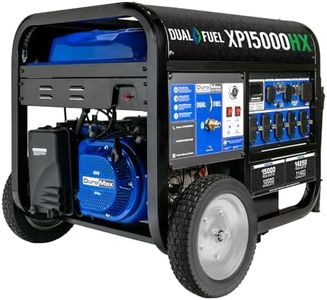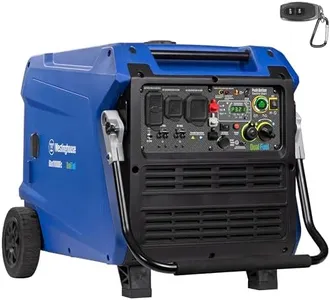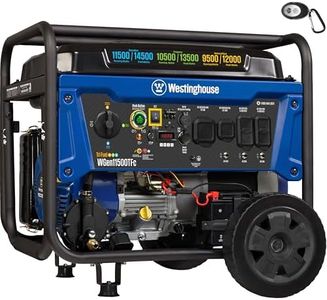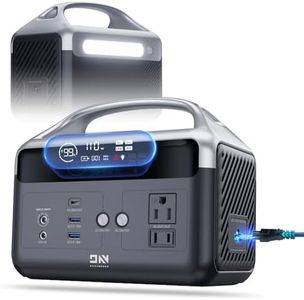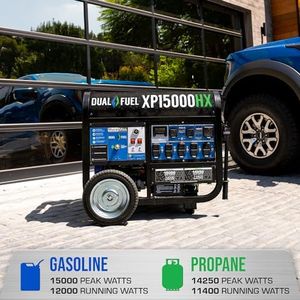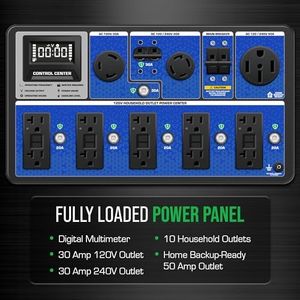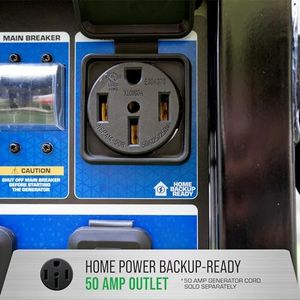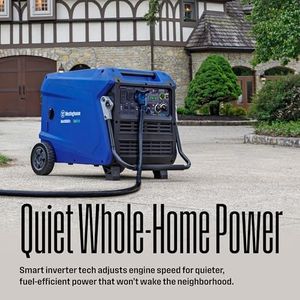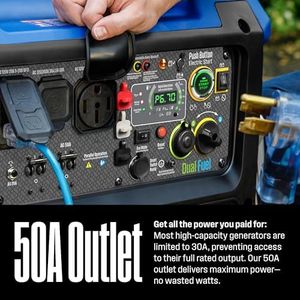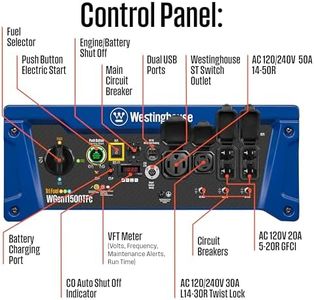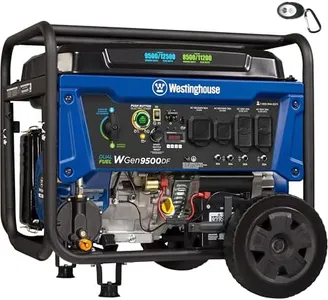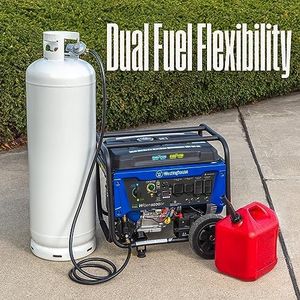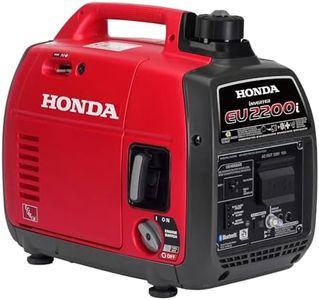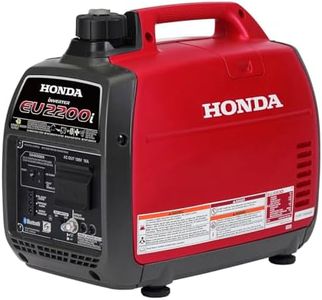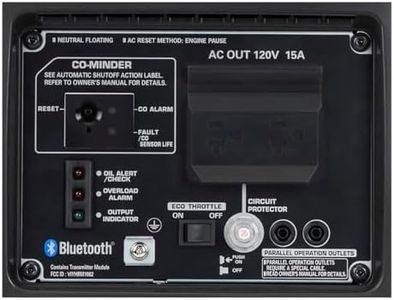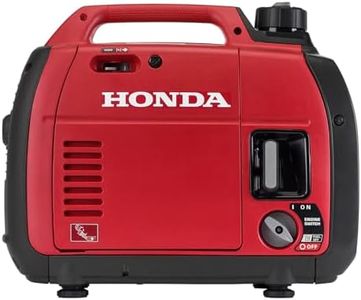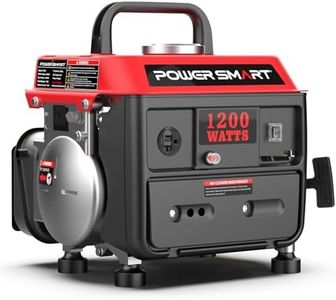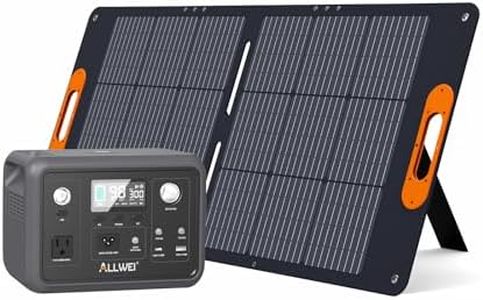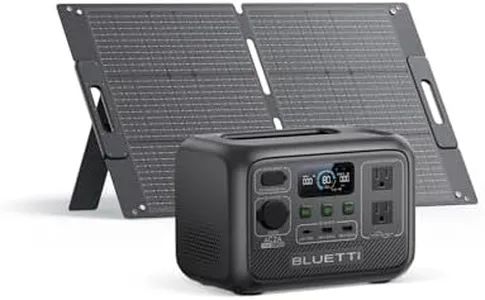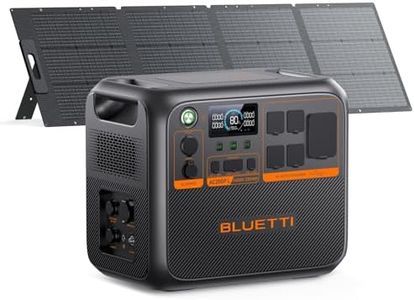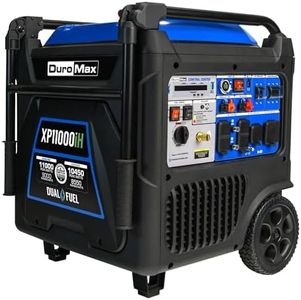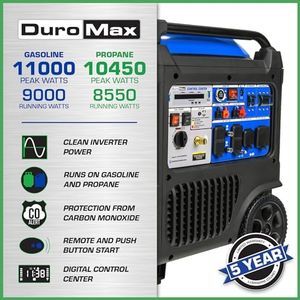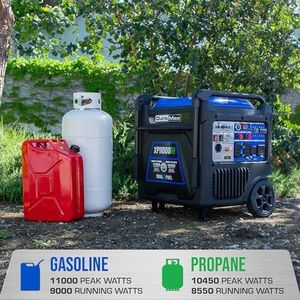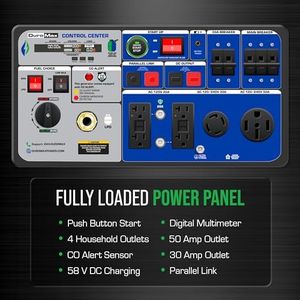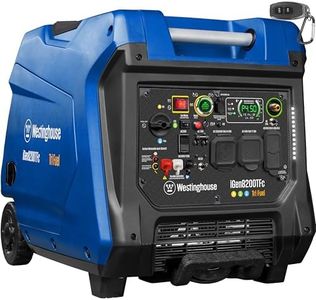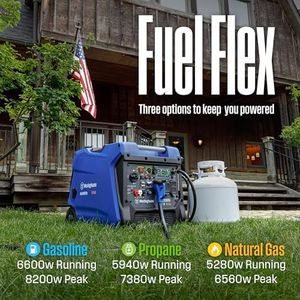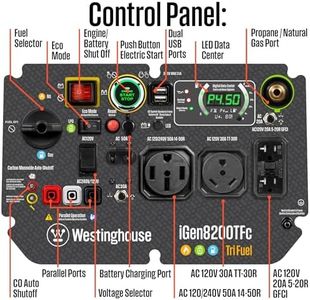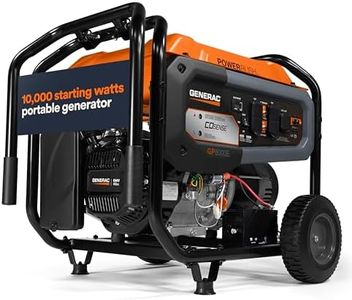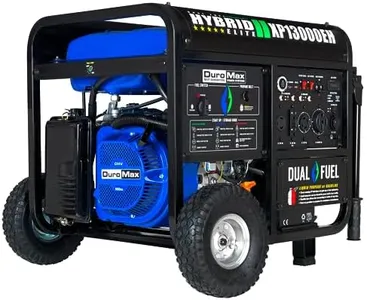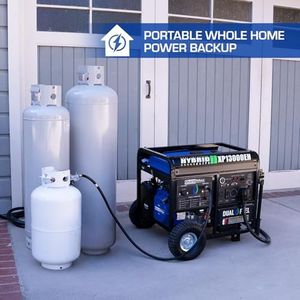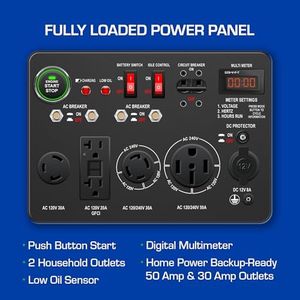10 Best Rv Generators 2026 in the United States
Winner
DuroMax XP15000HX 15,000-Watt Dual Fuel Portable Generator - Gas & Propane, Remote Electric Start, Whole Home Power Backup, Transfer Switch Ready, RV & Emergency Ready
The DuroMax XP15000HX is a powerful dual fuel generator offering up to 15,000 watts of starting power and 12,000 watts running power, making it suitable for RV users who need reliable backup power for longer trips or emergencies. Its ability to run on both gasoline and propane adds flexibility—propane is cleaner and easier to store, which is handy for RV storage and travel. The generator includes a remote electric start and a digital display that shows useful information like voltage and hours run, simplifying operation. It also features a CO Alert system that automatically shuts it down if dangerous fumes are detected, which is a nice safety addition for enclosed spaces like RVs.
Most important from
2390 reviews
Westinghouse 11000 Peak Watt Dual Fuel Portable Inverter Generator, Remote Electric Start, Transfer Switch Ready, Gas and Propane Powered, Low THD - Safe for Electronics, Parallel Capable, CO Sensor
The Westinghouse 11000 Peak Watt Dual Fuel Portable Inverter Generator is a robust and versatile option for RV owners. With a peak wattage of 11000 and running wattage of 9000 on gasoline, and slightly lower figures on propane, it provides substantial power to run multiple appliances simultaneously. The dual fuel capability offers flexibility, allowing you to choose between gasoline and propane based on availability and convenience.
Most important from
1336 reviews
Westinghouse 14500 Peak Watt Tri-Fuel Home Backup Portable Generator, Remote Electric Start, Transfer Switch Ready, Gas, Propane, and Natural Gas Powered
The Westinghouse Outdoor Power Equipment 14500 Peak Watt Tri-Fuel Generator is a robust option for those needing dependable power, whether for RV trips or as a backup for larger homes. With a peak wattage of 14,500 using gasoline and 12,000 watts using natural gas, it delivers ample power for most household and recreational needs. One standout feature is its tri-fuel capability, allowing users to choose between gasoline, propane, or natural gas, adding versatility depending on availability. Plus, it boasts an impressive run time of up to 19 hours on a full tank, making it particularly useful for longer outings or power outages.
Most important from
2785 reviews
Top 10 Best Rv Generators 2026 in the United States
Winner
DuroMax XP15000HX 15,000-Watt Dual Fuel Portable Generator - Gas & Propane, Remote Electric Start, Whole Home Power Backup, Transfer Switch Ready, RV & Emergency Ready
DuroMax XP15000HX 15,000-Watt Dual Fuel Portable Generator - Gas & Propane, Remote Electric Start, Whole Home Power Backup, Transfer Switch Ready, RV & Emergency Ready
Chosen by 1157 this week
Westinghouse 11000 Peak Watt Dual Fuel Portable Inverter Generator, Remote Electric Start, Transfer Switch Ready, Gas and Propane Powered, Low THD - Safe for Electronics, Parallel Capable, CO Sensor
Westinghouse 11000 Peak Watt Dual Fuel Portable Inverter Generator, Remote Electric Start, Transfer Switch Ready, Gas and Propane Powered, Low THD - Safe for Electronics, Parallel Capable, CO Sensor
Westinghouse 14500 Peak Watt Tri-Fuel Home Backup Portable Generator, Remote Electric Start, Transfer Switch Ready, Gas, Propane, and Natural Gas Powered
Westinghouse 14500 Peak Watt Tri-Fuel Home Backup Portable Generator, Remote Electric Start, Transfer Switch Ready, Gas, Propane, and Natural Gas Powered
Westinghouse 12500 Watt Dual Fuel Home Backup Portable Generator, Remote Electric Start, Transfer Switch Ready, Gas and Propane Powered
Westinghouse 12500 Watt Dual Fuel Home Backup Portable Generator, Remote Electric Start, Transfer Switch Ready, Gas and Propane Powered
Honda 664240 EU2200i 2200 Watt Portable Inverter Generator with Co-Minder
Honda 664240 EU2200i 2200 Watt Portable Inverter Generator with Co-Minder
DuroMax XP11000iH 11,000-Watt Dual Fuel Portable Digital Inverter Generator - Gas & Propane, Remote Electric Start, Transfer Switch Ready, RV & Emergency Ready
DuroMax XP11000iH 11,000-Watt Dual Fuel Portable Digital Inverter Generator - Gas & Propane, Remote Electric Start, Transfer Switch Ready, RV & Emergency Ready
Westinghouse 8200 Peak Watt Tri-Fuel Portable Inverter Generator, Remote Electric Start, Transfer Switch Ready, Gas, Propane, Natural Gas, Low THD, Safe for Electronics, Parallel Capable, CO Sensor
Westinghouse 8200 Peak Watt Tri-Fuel Portable Inverter Generator, Remote Electric Start, Transfer Switch Ready, Gas, Propane, Natural Gas, Low THD, Safe for Electronics, Parallel Capable, CO Sensor
DuroMax XP13000HX 13,000-Watt Dual Fuel Portable Generator - Gas & Propane, Electric Start, Whole Home Power Backup, Transfer Switch Ready, RV & Emergency Ready
DuroMax XP13000HX 13,000-Watt Dual Fuel Portable Generator - Gas & Propane, Electric Start, Whole Home Power Backup, Transfer Switch Ready, RV & Emergency Ready
Generac 10,000 Starting Watt Portable Gas Generator - Electric Start - Home Backup or RV Ready - Heavy Duty Frame - Quiet, Long Runtime, Emergency Power - 49-State Compliant
Generac 10,000 Starting Watt Portable Gas Generator - Electric Start - Home Backup or RV Ready - Heavy Duty Frame - Quiet, Long Runtime, Emergency Power - 49-State Compliant
DuroMax XP13000EH 13,000-Watt Dual Fuel Portable Generator - Gas & Propane, Electric Start, Whole Home Backup Power, Transfer Switch Ready, RV & Emergency Ready
DuroMax XP13000EH 13,000-Watt Dual Fuel Portable Generator - Gas & Propane, Electric Start, Whole Home Backup Power, Transfer Switch Ready, RV & Emergency Ready
Our technology thoroughly searches through the online shopping world, reviewing hundreds of sites. We then process and analyze this information, updating in real-time to bring you the latest top-rated products. This way, you always get the best and most current options available.

